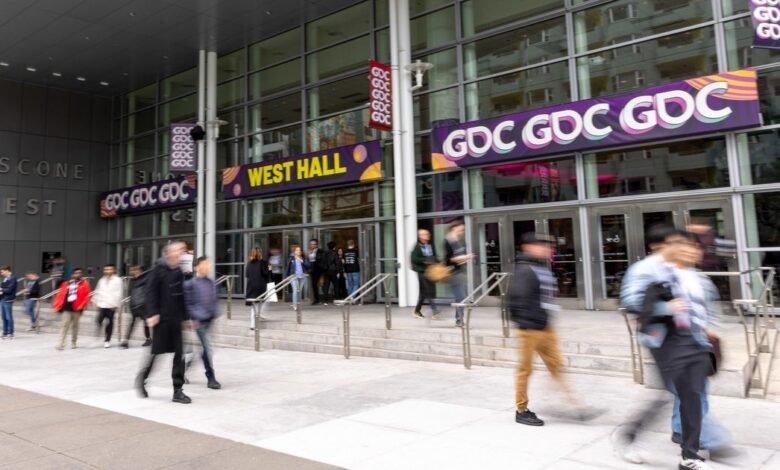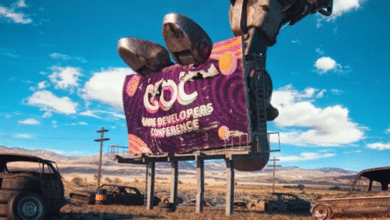Inside the GDC’s Transformation: Adapting to Industry Shifts

▼ Summary
– The GDC Festival of Gaming teaser campaign received negative industry reactions but successfully communicated that the event is undergoing significant changes.
– The new Festival Pass offers traditional GDC content at nearly half the previous All Access price while expanding to a full week, with a separate Game Changers pass for senior professionals.
– GDC is expanding beyond the Moscone Center into surrounding hotels and Yerba Buena while maintaining its developer-focused identity rather than targeting consumers.
– Content formats are being diversified with new approaches like fireside chats and debates, while maintaining the same volume of sessions spread throughout the week.
– The conference is broadening its definition of “developer” to include supporting roles like marketing and QA, and addressing ongoing concerns about costs and accessibility.
Mark DeLoura’s typically upbeat expression shifts when the teaser campaign comes up. The announcement that the Game Developers Conference would rebrand as the GDC Festival of Gaming arrived with CGI videos showing the old logo being demolished, a move that sparked widespread backlash across the industry. It’s evident the reaction stung.
“When people talk about your ads, you’ve succeeded in some way,” he reflects thoughtfully. “As someone who’s attended GDC for years and served on its advisory board, watching a giant robot crush the GDC sign hit close to home. Still, we had to communicate that this isn’t business as usual, and that part worked.”
The teasers hinted at transformation without specifics, fueling theories that GDC planned to pivot toward consumers. Last week brought clarity: the event isn’t shifting that dramatically. Core programming now spans a full week, accessible via a Festival Pass priced nearly 45% lower than previous All Access passes. A new Game Changers tier offers premium features for senior professionals.
DeLoura, Executive Director for Innovation and Growth at GDC’s parent company Informa, is no newcomer to the conference scene. He still keeps the thick show directory from his first GDC in 1997, before holding leadership positions at Sony, Ubisoft, and Google. His dual perspective, respecting GDC’s legacy while acknowledging critiques about cost and location, shapes his approach. In discussions before the changes went public, he outlined a vision for a more expansive, inclusive GDC that engages more of San Francisco and supports a games industry facing significant challenges. Below, his insights are condensed for clarity.
Many interpreted “Festival of Gaming” as a consumer-focused shift. Since that’s not the case, what makes it a festival?
The festival concept means broadening the conference’s scope without entering the consumer space. GDC remains by developers, for developers. We’re reimagining how we use the city. Instead of being confined to Moscone’s West and North halls, we’ll extend into nearby hotels. Events will take place at Yerba Buena, with dedicated pods for Game Changers pass holders. The W Hotel will host Hospitality Suites for executive meetings, including private NDA rooms. We’re planning activations in nearby buildings too. The goal is to celebrate development as a whole, not just sitting in session rooms.
Expanding beyond Moscone Center into hotels could meet resistance. How will access work? Will the W Hotel become exclusive to Game Changers?
Not at all. We’re reserving certain spaces, but all the familiar venues remain open. The W’s cabanas, for instance, were popular in past years, I’ve had many late nights there myself, and they’ll stay accessible.
Cost has always been a major pain point. Does the Festival Pass solve this?
More conversations among more people make the event stronger, so we want to welcome them in. Lowering the pass price helps, though travel and lodging remain hurdles for non-locals. By cutting the main pass cost by 45% and extending it to a full week, the Festival Pass essentially replaces the old All Access pass (minus GDC Vault access) at almost half the price. We hope this encourages broader participation.
The industry is weathering a tough period, and everything is shifting. In times of change, you either build walls or reach out. GDC has always been about connection, communication, and mutual learning, that’s been its special quality for forty years.
Is the Game Changers pass more expensive because it targets those with bigger budgets?
It aligns more closely with prior All Access pricing. It includes a year of GDC Vault access, the Luminaries speaker program, and entry to meeting pods at Yerba Buena. Many suited for this pass are developers racing between hotel rooms to pitch their games, if we can offer them a dedicated spot for meetings, we’re solving a real need.
Will the Festival Pass include GDC’s foundational content?
Absolutely. This year, we’re shaking up the format. We have the same volume of content but breaking from the usual panel/lecture structure. We’re experimenting with fireside chats, revisiting keynotes, and considering debates, something other conferences do well. Sticking to patterns has its place, but it’s time to try new things.
What types of speakers will the Luminaries Series feature?
We’re thinking of speakers addressing an executive audience, which could mean executives themselves, analysts, or investors. Some of the most memorable DICE talks came from outside gaming, discussing creativity or team investment. We’re exploring talks that encourage cross-industry learning. Someone recently described it as “TEDxGDC”, not a perfect analogy, but it reframes the concept.
Who is the target audience for Luminaries?
Studio directors and above, those managing teams or managing managers. We aim to support studio heads, VPs, tech directors, and production directors who balance game development with team-building, communication, and financing.
How is the content schedule changing for Festival Pass holders?
The old division between summits and core tracks no longer fits. We still see value in the community-building summits provided, so we’re spreading that content across the week in thematic chunks. Early days focus on networking, midweek on practical work, and later days on cross-disciplinary collaboration. It’s a complex scheduling challenge, but we’re working through it.
Are you expanding topic coverage to attract a wider audience?
We’re embracing everyone who supports game development. When I say “developer,” I include those in sales, marketing, and QA, not just coders. Traditionally, GDC centered on builders; now we’re focusing on the entire ecosystem. We also want to incorporate creators from Fortnite, Roblox, and Minecraft. At what point do they become developers? These are conversations GDC should host.
Games technology has spread into education, automotive dashboards, and retail. Shouldn’t we dialogue with those applying our tools?
With California’s centrality in gaming shifting, did you consider moving GDC?
It’s an ongoing discussion. Our advisory board of fifty developers meets annually, and cost and travel always come up. San Francisco remains a hub for U.S. game development, though Los Angeles and Seattle are strong contenders. Other conferences like SIGGRAPH and Gamescom rotate locations. Informa’s Black Hat moves, too. San Francisco has been a great partner, but costs are steep, a $25 sandwich gives anyone pause. For indie or Roblox developers, a five-day trip is daunting. We’re keeping an open mind.
Have cost concerns affected attendance or speaker applications?
Attendee and speaker numbers have held steady, but cost worries are legitimate. International visitors face visa and travel hurdles. By starting our process earlier this year, we hope to give global attendees more time to arrange visas. International participation is vital, for connecting with outsourcing partners or gaining cross-cultural insights. We must foster that.
What’s the idea behind the new networking platform?
We’re piloting curated networking this year. If someone has specific goals, like executives seeking standout indie titles, we can facilitate introductions they might not make otherwise. Networking is a major focus for us in this reinvention.
Is curated networking exclusive to Game Changers?
That’s still evolving. Game Changers pass holders will use the Game Plan system, but we’re weighing whether to extend access. We’re learning from other events, though the games industry is unique. Our specialist noted how different our community is, which is exactly why we need experts to help tailor the approach.
There will always be critics of any change.
People may disagree with our decisions. We aim to understand their perspective and hope they understand ours, we’re trying to make choices that sustain these systems. Having been involved when SIGGRAPH integrated game tech, I’ve seen how nonprofit and corporate conferences differ in incentives and growth models. Each has distinct priorities.
(Source: NewsAPI Gaming Technology)
